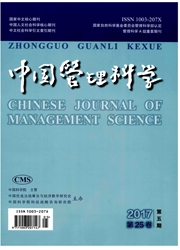

 中文摘要:
中文摘要:
多属性决策问题的决策中,决策者往往对属性上的数值存在一定的心理预期。首先,通过心理预期与实际数据获得决策对象在每个属性上的满意度,对决策对象进行筛选过滤;其次,提出属性值信息相容关系,利用属性值之间的相容度进行赋权,信息融合对满足决策者心理预期的决策对象排序择优;再次,提出决策对象满意度,并指出传统的排序方法获取的最优决策对象与决策者总体满意度最大的决策对象并不等价。具体算例表明,该方法科学有效且可行。
 英文摘要:
英文摘要:
This paper mainly focuses on this situation in the Multiple Criteria Decision Making (MCDM) problems with interval number that decision makers always have a basic expectation on some criteria. Firstly, we filter off the useless alternatives and find out the useful criteria that can arrive to the basic satisfaction degree of the decision makers on all criteria. By using the useful alternatives construct a new data table and select out the best alternative from the new table. Secondly, we propose a new definition of tolerance relation for criteria value and use the tolerance degree of criteria value to obtain the criteria weights. Thirdly, we also propose a new definition for satisfaction degree of alternatives. The best alternative(s) in decision making found by the traditional ranking methods does not have an equivalence relation with the alternative(s) that have the biggest combinatorial satisfaction degree of decision makers. Finally, an interval number example shows that the method is scientific and effective as well as feasible.
 同期刊论文项目
同期刊论文项目
 同项目期刊论文
同项目期刊论文
 The Optimal Cost-Sharing Incentive Model of Main Manufacturer -Suppliers for Complex Equipment under
The Optimal Cost-Sharing Incentive Model of Main Manufacturer -Suppliers for Complex Equipment under Profits Distribution within Main Manufacturer and Suppliers in Supply Chain Based on Synergetic Theo
Profits Distribution within Main Manufacturer and Suppliers in Supply Chain Based on Synergetic Theo Development and Application of MSGT6.0 (Modeling System of Grey Theory 6.0) Based on Visual C# and X
Development and Application of MSGT6.0 (Modeling System of Grey Theory 6.0) Based on Visual C# and X A robust optimization approach to reduce the bullwhip effect of supply chains with vendor order plac
A robust optimization approach to reduce the bullwhip effect of supply chains with vendor order plac Methods of Face Recognition based on Local Singular Value Decomposition and Grey Relational Analysis
Methods of Face Recognition based on Local Singular Value Decomposition and Grey Relational Analysis An extension of grey target method with multistage fuzzy linguistic evaluation under incomplete weig
An extension of grey target method with multistage fuzzy linguistic evaluation under incomplete weig Research on irrational bubbles in the stock market based on the perspective of generalized virtual e
Research on irrational bubbles in the stock market based on the perspective of generalized virtual e Modeling and simulation of stranded passengers'; transferring decision-making on the basis of herd b
Modeling and simulation of stranded passengers'; transferring decision-making on the basis of herd b Multiple stages grey target decision making method with incomplete weight based on multi-granularity
Multiple stages grey target decision making method with incomplete weight based on multi-granularity Modeling and simulation of stranded passengers’ transferring decision-making on the basis of herd be
Modeling and simulation of stranded passengers’ transferring decision-making on the basis of herd be The Impact on Chinese Economic Growth and Energy Consumption of the Global Financial Crisis: An Inpu
The Impact on Chinese Economic Growth and Energy Consumption of the Global Financial Crisis: An Inpu 期刊信息
期刊信息
